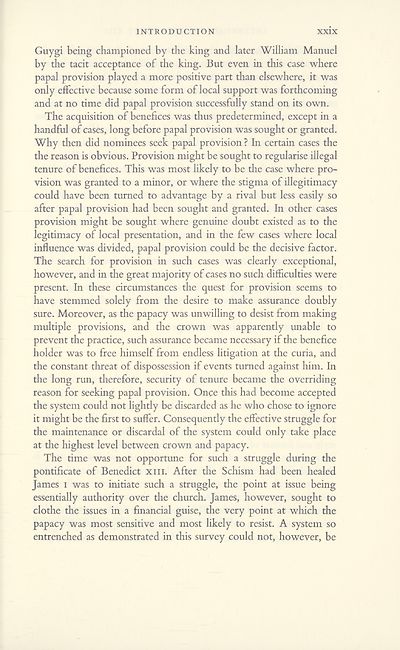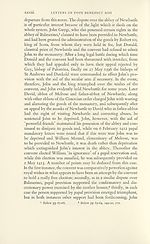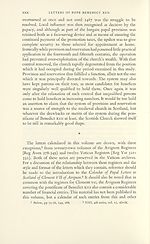Series 4 > Calendar of Papal letters to Scotland of Benedict XIII of Avignon, 1394-1419
(34) Page xxix
Download files
Complete book:
Individual page:
Thumbnail gallery: Grid view | List view

INTRODUCTION
XXIX
Guygi being championed by the king and later William Manuel
by the tacit acceptance of the king. But even in this case where
papal provision played a more positive part than elsewhere, it was
only effective because some form of local support was forthcoming
and at no time did papal provision successfully stand on its own.
The acquisition of benefices was thus predetermined, except in a
handful of cases, long before papal provision was sought or granted.
Why then did nominees seek papal provision ? In certain cases the
the reason is obvious. Provision might be sought to regularise illegal
tenure of benefices. This was most likely to be the case where pro¬
vision was granted to a minor, or where the stigma of illegitimacy
could have been turned to advantage by a rival but less easily so
after papal provision had been sought and granted. In other cases
provision might be sought where genuine doubt existed as to the
legitimacy of local presentation, and in the few cases where local
influence was divided, papal provision could be the decisive factor.
The search for provision in such cases was clearly exceptional,
however, and in the great majority of cases no such difficulties were
present. In these circumstances the quest for provision seems to
have stemmed solely from the desire to make assurance doubly
sure. Moreover, as the papacy was unwilling to desist from making
multiple provisions, and the crown was apparently unable to
prevent the practice, such assurance became necessary if the benefice
holder was to free himself from endless litigation at the curia, and
the constant threat of dispossession if events turned against him. In
the long run, therefore, security of tenure became the overriding
reason for seeking papal provision. Once this had become accepted
the system could not lightly be discarded as he who chose to ignore
it might be the first to suffer. Consequently the effective struggle for
the maintenance or discardal of the system could only take place
at the highest level between crown and papacy.
The time was not opportune for such a struggle during the
pontificate of Benedict xm. After the Schism had been healed
James I was to initiate such a struggle, the point at issue being
essentially authority over the church. James, however, sought to
clothe the issues in a financial guise, the very point at which the
papacy was most sensitive and most likely to resist. A system so
entrenched as demonstrated in this survey could not, however, be
XXIX
Guygi being championed by the king and later William Manuel
by the tacit acceptance of the king. But even in this case where
papal provision played a more positive part than elsewhere, it was
only effective because some form of local support was forthcoming
and at no time did papal provision successfully stand on its own.
The acquisition of benefices was thus predetermined, except in a
handful of cases, long before papal provision was sought or granted.
Why then did nominees seek papal provision ? In certain cases the
the reason is obvious. Provision might be sought to regularise illegal
tenure of benefices. This was most likely to be the case where pro¬
vision was granted to a minor, or where the stigma of illegitimacy
could have been turned to advantage by a rival but less easily so
after papal provision had been sought and granted. In other cases
provision might be sought where genuine doubt existed as to the
legitimacy of local presentation, and in the few cases where local
influence was divided, papal provision could be the decisive factor.
The search for provision in such cases was clearly exceptional,
however, and in the great majority of cases no such difficulties were
present. In these circumstances the quest for provision seems to
have stemmed solely from the desire to make assurance doubly
sure. Moreover, as the papacy was unwilling to desist from making
multiple provisions, and the crown was apparently unable to
prevent the practice, such assurance became necessary if the benefice
holder was to free himself from endless litigation at the curia, and
the constant threat of dispossession if events turned against him. In
the long run, therefore, security of tenure became the overriding
reason for seeking papal provision. Once this had become accepted
the system could not lightly be discarded as he who chose to ignore
it might be the first to suffer. Consequently the effective struggle for
the maintenance or discardal of the system could only take place
at the highest level between crown and papacy.
The time was not opportune for such a struggle during the
pontificate of Benedict xm. After the Schism had been healed
James I was to initiate such a struggle, the point at issue being
essentially authority over the church. James, however, sought to
clothe the issues in a financial guise, the very point at which the
papacy was most sensitive and most likely to resist. A system so
entrenched as demonstrated in this survey could not, however, be
Set display mode to:
![]() Universal Viewer |
Universal Viewer | ![]() Mirador |
Large image | Transcription
Mirador |
Large image | Transcription
Images and transcriptions on this page, including medium image downloads, may be used under the Creative Commons Attribution 4.0 International Licence unless otherwise stated. ![]()
| Scottish History Society volumes > Series 4 > Calendar of Papal letters to Scotland of Benedict XIII of Avignon, 1394-1419 > (34) Page xxix |
|---|
| Permanent URL | https://digital.nls.uk/126659079 |
|---|
| Description | Over 180 volumes, published by the Scottish History Society, containing original sources on Scotland's history and people. With a wide range of subjects, the books collectively cover all periods from the 12th to 20th centuries, and reflect changing trends in Scottish history. Sources are accompanied by scholarly interpretation, references and bibliographies. Volumes are usually published annually, and more digitised volumes will be added as they become available. |
|---|


